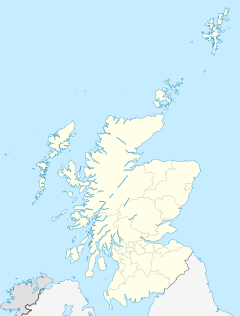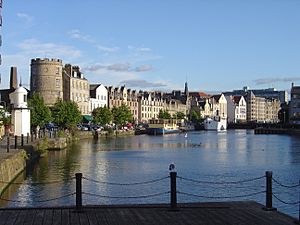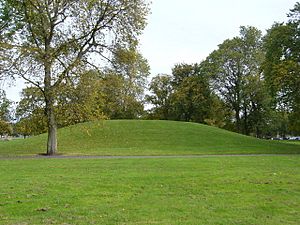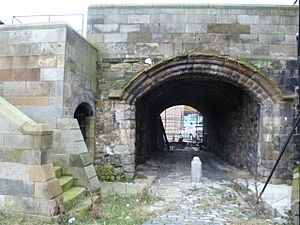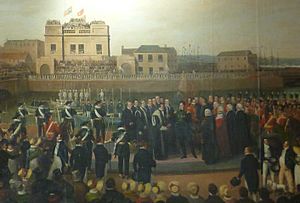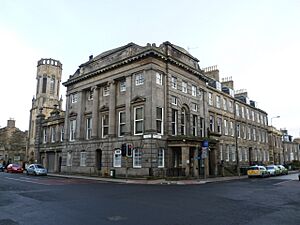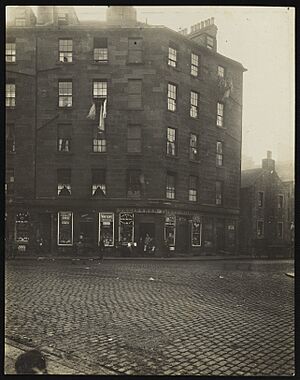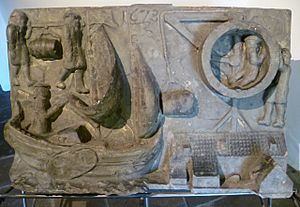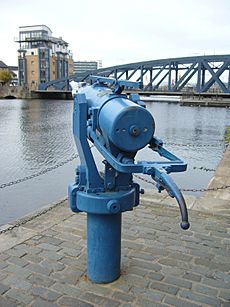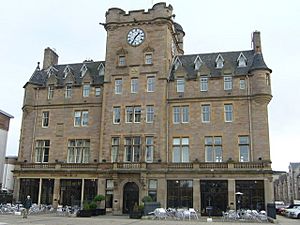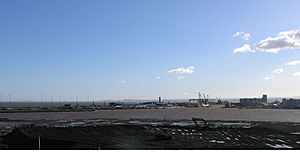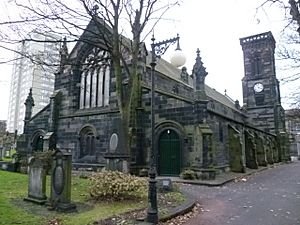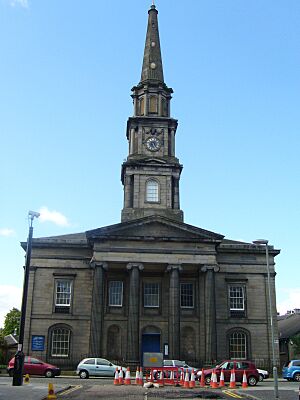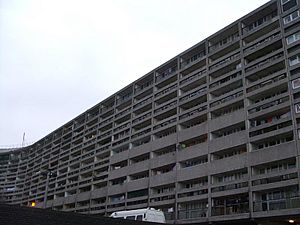Leith facts for kids
Quick facts for kids Leith
|
|
|---|---|
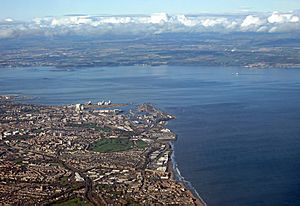 Aerial view of Leith and the Firth of Forth |
|
| Population | 50,030 (2011) |
| Council area |
|
| Lieutenancy area | |
| Country | Scotland |
| Sovereign state | United Kingdom |
| Post town | EDINBURGH |
| Postcode district | EH6 |
| Dialling code | 0131 |
| Ambulance | Scottish |
| EU Parliament | Scotland |
| UK Parliament | |
| Scottish Parliament | |
Leith (pronounced "Leeth") is a lively port area in the north of Edinburgh, Scotland. It sits right where the Water of Leith river meets the sea. This area is famous for its busy Port of Leith.
People first wrote about Leith in 1128. Back then, it was called Inverlet. For many years, Edinburgh controlled Leith. But in 1833, Leith became its own town. Later, in 1920, it joined with Edinburgh again.
Leith is on the southern coast of the Firth of Forth, which is a large bay. It is part of the City of Edinburgh council area. Since 2007, Leith has been one of the city's 17 areas, each with several elected representatives.
Contents
History of Leith
As Edinburgh's main port, Leith has played a big part in Scottish history. Many important events happened here.
Early Settlements in Leith
Archaeologists have found old things in Leith, especially near The Shore. They found parts of medieval docks from the 1100s. This matches the first written records of Leith.
In 1449, Mary of Guelders, who was marrying King James II, arrived in Leith. She rested at the Convent of St Anthony. Leith was home to important merchants. For example, James Makysone supplied tapestries to King James IV in 1498. He also brought timber from France to build the king's ships.
Leith in the 1500s
In 1543, the English army, led by the Earl of Hertford, burned Leith. This happened because Scotland refused a peace treaty with England. Later, in 1560, Mary of Guise ruled Scotland from Leith. Her daughter, Mary, Queen of Scots, was in France. Mary of Guise moved the Scottish Court to Leith. Her palace was on Rotten Row, now Water Street. You can see her coat of arms from 1560 at South Leith Parish Church.
When Scottish Protestant lords and English troops attacked the French soldiers in Leith, Mary of Guise had to hide in Edinburgh Castle. She died in June 1560. The Siege of Leith ended, and the French troops left. This was part of the Treaty of Leith.
On Leith Links, there are two mounds called "Giant's Brae" and "Lady Fyfe's Brae." People think these were hills where cannons were placed during the siege in 1560. On May 7, 1560, English and Scottish soldiers attacked Leith's walls. Their ladders were too short! Many soldiers were hurt.
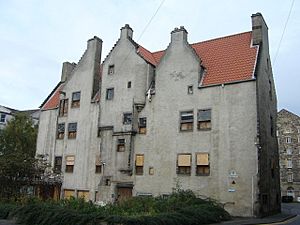
On August 19, 1561, Mary, Queen of Scots, arrived in Leith. She stopped briefly at Andrew Lamb's house. Then, she went to Holyrood Palace to begin her rule. Mary's court would come to Leith's sands for horse riding games.
After Mary Queen of Scots gave up her crown in 1567, a civil war started. Soldiers supporting James VI of Scotland stayed in Leith from 1571 to 1573. This time was called the "Wars between Leith and Edinburgh." In 1590, James's wife, Anne of Denmark, stayed at the King's Wark when she arrived.
Leith in the 1600s
In 1622, there was a fight between Spanish privateer ships and Dutch ships. King James allowed a Spanish ship to stay in Leith. Dutch ships attacked it. The fighting stopped when the tide made the ships get stuck. Scottish officials asked them to stop fighting. The ships were allowed into Leith harbour. Cannons from Edinburgh Castle were set up to keep the peace.
Leith suffered greatly during the 1645 plague. More than half the people in the southern part of town died. In 2016, archaeologists found a mass grave of 81 bodies from this plague. People were so scared that they buried bodies quickly, sometimes with money still on them.
In 1650, Leith was a battleground. General David Leslie built a wall between Calton Hill and Leith. This was to defend Edinburgh from Oliver Cromwell's army. This wall became the famous street, Leith Walk. After Cromwell won the Battle of Dunbar in 1650, he built a fort in Leith in 1656. This fort, called Leith Citadel, controlled port traffic. Today, only a vaulted entrance on Dock Street remains. A new business, the Leith Sugar House, started in 1677.
Leith in the 1700s
During the American War of Independence, a Scottish sailor named John Paul Jones tried to capture Leith. He wanted to hold it for money. But a storm in September 1779 stopped him. This scare led to the quick building of Leith Fort in 1780. It had nine cannons and was designed by James Craig, who designed Edinburgh's New Town. The fort was used until 1955. Most of it was knocked down to build new homes. Two old gatehouses still stand at the southern entrance.
For centuries, South Leith did not have its own church. After the Scottish Reformation, South Leith Parish Church, built in 1483, became the main church. In 1811, South Leith had almost 16,000 people. North Leith had almost 5,000. The foundation stone for a new church in North Leith was laid in 1814.
Leith was where King George IV arrived for his visit to Scotland in 1822. The Old Ship Hotel and King's Landing got its name from this event. The king arrived by boat at Leith Shore. A painting of this event used to hang in Leith Town Hall.
Leith in the 1800s
On May 20, 1806, the first new wet dock in Scotland opened in Leith. Many important people attended. The first ship to enter was The Buccleuch. Cannons fired from the fort and warships. The second wet dock opened in 1817. That same year, the Trinity House building was built.
In 1809, the Tally Toor, a round tower, was built to protect the harbour during the Napoleonic Wars. It is still there today.
| Leith Municipal Government Act 1827 | |
|---|---|
| Act of Parliament | |
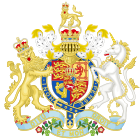
|
|
| Citation | 7 & 8 Geo. 4. c. cxii |
| Dates | |
| Royal assent | 2 July 1827 |
| Other legislation | |
| Repealed by | Leith Municipal and Police Act 1848 |
| Text of statute as originally enacted | |
For a long time, Edinburgh's council governed Leith. This was not very good, and parts of Leith had no local government. In 1827, a new law, the Leith Municipal Government Act 1827, changed this. It gave Leith its own local government for things like lighting and cleaning. In 1833, Leith became a separate town with its own mayor (provost) and council.
In 1896, Emperor Nicholas II of Russia arrived in Leith by sea.
Leith in the 1900s and 2000s
Leith was the site of a big dockers strike in 1913.
Leith and Edinburgh grew so much that they became one big urban area. In 1920, Leith joined Edinburgh. Most people in Leith voted against this merger. At that time, Leith had 80,000 people. It was Scotland's sixth largest town.
Until 1923, you had to change trams at Leith Walk to go between Leith and Edinburgh. Leith trams were electric, but Edinburgh's were pulled by cables. This changed when Edinburgh's trams became electric.
Leith has changed a lot and is now a busy port. Cruise ships visit, and the Royal Yacht Britannia is permanently docked here. The Ocean Terminal shopping centre is also in Leith. Many Scottish Government offices are located here. The 'Leith Project' helped boost the economy. The Shore area, once industrial, now has many new pubs and restaurants. In 2003, Leith hosted the MTV Europe Music Awards.
Traditional Industries in Leith
For centuries, Leith was a leader in many industries in Scotland. Some of the most important were:
- Glass: The Leith Glassworks started in 1746. They made wine bottles, mostly for export. At its busiest, they made one million bottles a week! Around 1770, they also started making lead crystal glass for things like chandeliers.
- Soap: The Anchor Soapworks began around 1680. They mostly used whale oil to make soap. This business lasted until about 1930.
- Wine and Whisky Storage: Leith has stored wine since the 1500s. At one point, there were about 100 warehouses for wine and brandy. In the late 1800s, many of these warehouses started storing whisky. Famous whisky companies like William Sanderson (Vat 69) and John Crabbie were here. The last whisky warehouse closed around 1995.
- Lime Juice: Rose's lime juice was started by Lachlan Rose in Leith in 1868. It was mainly made to give sailors vitamin C.
- Shipbuilding: Leith built many ships. It was known for special ships like tugs and cable-laying ships. The largest shipyard, Henry Robb's, closed in 1983. Famous ships built here include the SS Sirius, one of the first steamships to cross the Atlantic. During World War II, Robb's yard built many ships for the Royal Navy.
- Lead: Scotland's biggest leadworks was in Leith. It made lead pipes for water and lead sheets for roofs. It also made lead shot for weapons.
- Sugar Refining: The Leith Sugar House started making sugar in 1677.
- Whaling: In the 1800s, Leith ships started hunting whales in the Antarctic. The Christian Salvesen company had a big whaling business. They even named a whaling station in South Georgia "Leith Harbour". This company brought the first penguins to Edinburgh Zoo around 1900.
- Corn Trading: A Corn Exchange (a place to trade grain) was built in 1861.
- Fishing: In the 1800s, Leith became important for trading herring.
Geography and Modern Leith
After many years of factories closing and people moving away, Leith started to get better in the late 1980s. Old industrial sites were turned into affordable homes. Small business units were built. The Shore area became popular with fancy restaurants. The Water of Leith riverbanks were cleaned up, and a public walkway opened.
Leith's revival was also helped when the Scottish government built new offices in Leith Docks. This brought more jobs. More big developments followed, like Ocean Terminal and the Royal Yacht Britannia.
The Edinburgh Trams line now extends from the city centre to Newhaven. It opened in June 2023. This makes it easy for people to travel to and from Leith.
In 2004, the company that owns the docks, Forth Ports, announced plans to close the port eventually. They plan to build a new small town with up to 17,000 new homes.
Leith's Areas
One area is Timber Bush, which was once a market for wood.
Until Leith joined Edinburgh in 1920, its southern border was the middle of Pilrig Street.
In the 1700s, new streets were built. One was Queen Charlotte Street, named after Queen Charlotte, wife of King George III.
Religion in Leith
Historically, Leith had strong Catholic ties. Even after the Reformation, it was one of the last towns with Catholic sympathies. Today, Leith has many historic churches. These include North Leith Parish Church and South Leith Parish Church. There is also the Roman Catholic St Mary's Star of the Sea.
Leith is a very diverse place. It has Sikh and Hindu temples. There is a Shia imambargah and a Sunni mosque. You can also find a Pentecostal centre and a Ukrainian Greek Catholic church. A former Norwegian church is now home to the Leith School of Art.
In 2011, almost half of Leith's people said they were not religious. About 18.5% belonged to the Church of Scotland. 15% were Catholic.
Religion in Leith (2011) Not religious (48.9%) Church of Scotland (18.5%) Catholic Church (15.0%) Other Christian (5.8%) Islam (2.4%) Other religions (2.4%) Not stated (7.0%)
Transport in Leith
In the mid-1700s, regular stage coaches ran between Bernard Street and Edinburgh's Old Town. By 1863, horse-drawn buses ran every 5 minutes. Around 1880, these became horse-drawn trams. Leith was the first town in Scotland to have electric trams in 1905. These trams ran until 1956.
The railways came to Leith in the mid-1800s. Leith had one horse-drawn line even before steam trains. It brought coal from Dalkeith. Steam trains arrived in the 1840s. At its peak, Leith had four passenger train stations. However, in the 1960s, most of Leith's railway lines closed. Today, only one freight line to the docks is still used.
Two old station buildings remain:
- Leith Central: On Leith Walk and Duke Street. The station clock, offices, and a pub (Central Bar) are still there.
- Leith Citadel: On Commercial Street. This building is now a youth centre.
The SS Sirius, built in Leith, was one of the first steamships to cross the Atlantic. Leith also had ferry services to many European ports.
Today, Lothian Buses provide bus services in Leith. The Edinburgh Trams service opened in June 2023. It has stops at Balfour Street, Foot of the Walk, The Shore, Port of Leith, and Ocean Terminal.
Culture and Community in Leith
Leith has a history of leading the way in social improvements. Some of these were the first in Scotland:
From 1555, all boys received free education. This was paid for by local trade groups. From 1820, all girls also got free education. This was very early for free education for girls. A free hospital service started in 1777. Leith had electric street lighting from 1890 and electric trams from 1905. The first public sewer in Scotland was built in Bernard Street in 1780.
Leith was once a port connected to the Hanseatic League, a group of trading cities.
Leith is also home to the Royal Yacht Britannia. This was once the Queen's floating home. Now, it is a popular visitor attraction.
In 2021, Time Out magazine named Leith the fourth "coolest neighbourhood in the world."
The Port of Leith distillery is being built. It will be the UK's only vertical whisky distillery.
Educational Establishments in Leith
Leith is home to Leith Academy, one of Scotland's oldest schools. It also has the Leith School of Art. This is one of only two independent art schools in Scotland.
From 1855 to 1987, Leith Nautical College trained sailors for the Merchant Navy.
Media and Art in Leith
Leith has many festivals throughout the year. These include Leith Festival, Leith Late festival, and the Edinburgh Mela. The Leith Gala, now called Leith Festival Gala Day, has happened every year since 1907. It used to raise money for hospital beds. Now, it is a community event.
Leith has many cultural arts studios and small businesses. These include the Leith Theatre, Leith School of Art, and WASP Studios.
Leith FM (later Castle FM) was a local radio station. It started as a short-term station during Leith Festival. It later got a permanent license.
Ethnicity in Leith
| Leith Ward compared (2022 Census Data) | Leith | Edinburgh |
|---|---|---|
| White | 86.8% | 84.9% |
| Asian | 5.9% | 8.6% |
| African/Caribbean | 2.1% | 2.1% |
| Mixed/Other | 5.2% | 4.4% |
| Leith Walk Ward compared (2022 Census Data) | Leith Walk | Edinburgh |
|---|---|---|
| White | 83.2% | 84.9% |
| Asian | 9.6% | 8.6% |
| African/Caribbean | 1.6% | 2.1% |
| Mixed/Other | 5.5% | 4.4% |
Sport in Leith
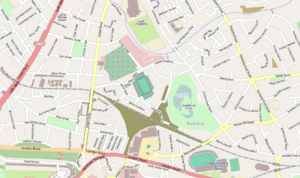
Leith is the home of Hibernian Football Club, a team in the Scottish Premiership.
Leith Athletic Football Club has been part of Leith's sports scene since 1887. They reformed in 1996 and play home games at Peffermill 3G.
Leith Links has been used for sports for centuries.
Leith is important in the history of golf rules. The Honourable Company of Edinburgh Golfers played there. The official rules of golf, first written in Leith in 1744, were later adopted by the Royal and Ancient Golf Club of St Andrews.
From at least 1600 until 1816, Leith Races were held on Leith Sands. These were important horse races.
Leith Links also has one of Scotland's oldest cricket pitches, from 1820.
The Leith Victoria Swim Centre opened in 1899.
Former Provosts of Leith
These are some of the people who served as the chief magistrate (Provost) of Leith before it merged with Edinburgh:
- Adam White (1833–1839)
- James Reoch (1839–1845)
- Thomas Hutchison (1845–1848)
- George Adiston McLaren (1848–1851)
- Robert Philip (1851–1855)
- James Taylor (1855–1860)
- William Lindsay (1860–1866)
- James Watt (1866–1875)
- Dr John Henderson (1875–1881 and 1886–1887) – He started the Leith Improvement Plan.
- James Pringle (1881–1886)
- Thomas Aitken (1887–1893)
- John Bennet (1893–1899)
- Sir Richard Mackie (1899–1908)
- Malcolm Smith (1908–1917)
- John Allan Lindsay (1917–1920) – He was the last Provost of Leith.
Notable People from Leith
Many interesting people have lived in Leith, including:
- William Lindsay Alexander (1808–1884), a religious scholar.
- Thomas Anderson (1819–1874), a chemist.
- Andrew Barton (c. 1466 – 1511), a privateer and naval leader.
- Eric "Winkle" Brown (1919–2016), a famous test pilot.
- Ken Buchanan (1945-2023), a world champion boxer.
- Ian Charleson (1949–1990), an actor.
- John Crabbie, who founded the famous Crabbie's ginger wine company.
- Helen Crummy (1920–2011), who started the Craigmillar Festival Society to help her community.
- Sir Tom Farmer, who founded Kwik-Fit and used to own Hibernian F.C..
- Dick Gaughan, a folk singer.
- Tallulah Greive, an actress.
- Leigh Griffiths, a footballer.
- Sir Peter Heatly (1924-2015), a famous diver.
- John Hughes (born 1964), a football manager.
- Vice Admiral John Hunter (1737-1821), the second Governor of New South Wales.
- Russell Hunter (1925-2004), an actor.
- Robert Jameson (1774–1854), a naturalist.
- Captain William Johnston VC (1879-1915), a brave soldier who won the Victoria Cross.
- Dr Thomas Latta (1796-1833), who invented the saline drip.
- Jack Lowden, a Scottish actor.
- Una McLean MBE, an actor.
- Willie Merrilees OBE QPM (1898-1984), a distinguished policeman.
- Thomas Morton (1781-1832), a shipbuilder and inventor.
- Eduardo Paolozzi (1924–2005), a famous pop artist and sculptor.
- Charlie and Craig Reid, from the folk band The Proclaimers.
- Henry Robb (1874-1951), a shipbuilder.
- J.K. Rowling, the author of the Harry Potter books.
- James Simpson (1830-1894), an architect who designed the Leith Improvement Scheme.
- Chris Small, a professional snooker player.
- William Struth (1875–1956), a football manager for Rangers FC.
- Danny Swanson, a footballer.
- Unicorn Kid (Oliver Sabin, born 1991), an electronic music composer.
- Irvine Welsh, the author of Trainspotting.
See also
 In Spanish: Leith para niños
In Spanish: Leith para niños


